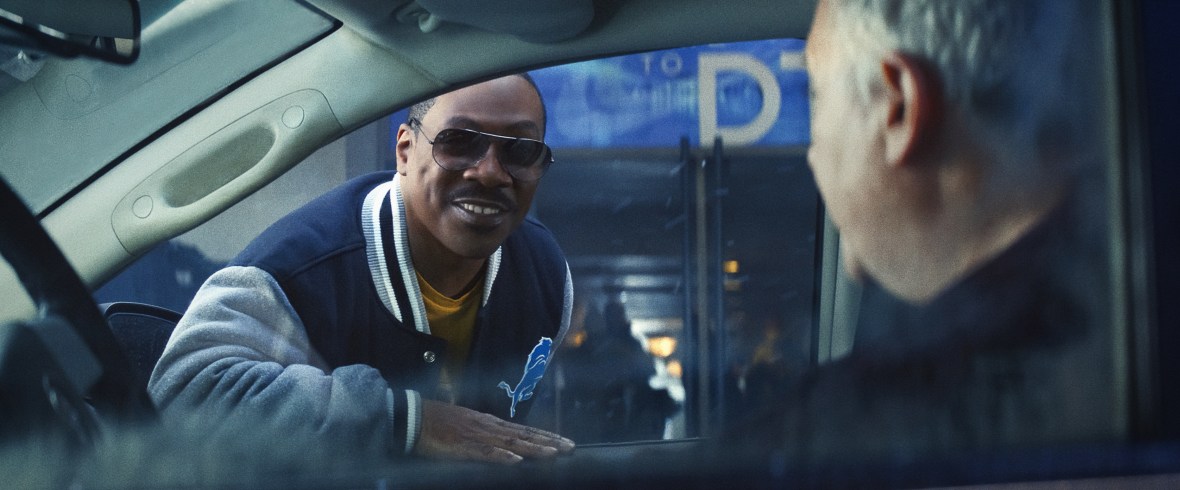Eddie Murphy’s Axel Foley is a Black cinematic hero because he represents Blackness outsmarting whiteness
Beverly Hills Cop: Axel F. (L to R) Eddie Murphy as Axel Foley and Paul Reiser as Jeffrey Friedman in “Beverly Hills Cop: Axel F.” (Courtesy of Netflix)
OPINION: Netflix’s “Beverly Hills Cop: Axel F” isn’t a good movie, but it does reminds me how much I love watching Murphy play the wisecracking Detroit cop.
Editor’s note: The following article is an op-ed, and the views expressed are the author’s own. Read more opinions on theGrio.
Netflix’s “Beverly Hills Cop: Axel F” is the fourth time we’ve seen Eddie Murphy’s Axel Foley, and I think I understand why Foley is something of a Black cinematic hero. First off, the big idea undergirding Foley’s world is that he’s a Detroit cop in Beverly Hills. This gives us a streetwise cop with swag, smarts and jokes who’s outwitting the moneyed criminals, incompetent cops, and gullible softies of Beverly Hills. It’s Murphy’s dynamic Blackness repeatedly outsmarting whiteness. Over and again Foley runs up against the power of one sort or another, and he defeats them without much more than his wits. It’s the realness of the D versus the weird, plastic, prettiness of BH. It’s empowering to see Foley outplay some of the richest, most entitled people in the country.
Second, Foley is a Br’er Rabbit trickster. He can talk his way out of anything. He’s constantly walking into situations where he’s in a tricky spot, and he uses his wits, words and skills as an improviser to talk his way into or out of anything. He’s a classic trickster from African-American lore who can fool almost anyone in almost any way he wants. In the original film, Foley gets to the front desk of the Beverly Hills Hotel and accuses them of being racist so he can get a room but at the maître d’s stand of a swanky Beverly Hills restaurant, he pretends to be gay so he can get past. He can take on almost any form in order to get over. We love a Br’er Rabbit trickster.
Third, Foley is a respectable cop. How? Because in these movies he’s always on a mission to save his friends or his family. He’s always out in Beverly Hills because he’s felt called to be there because someone he cares about is in danger. He’s not patrolling the streets, protecting the interests of the state and shooting innocent Black men. He’s using the power of the badge and the tactics of a real street cop to help his people and get them justice. He’s a cop with a heart of gold. Even in a world of ACAB and BLM, Foley is somehow still cool because he’s using the badge for good. In “Beverly Hills Cop: Axel F,” he’s driven to help his daughter, who’s a lawyer in BH. Also, in the prior films, Foley is the only cop who seems truly competent while in “Beverly Hills Cop: Axel F,” there’s a cop who’s truly evil so Foley looks like a good guy.
Recommended Stories
Alas, just because Foley is a great character doesn’t mean the movies are great. As far as quality in this series, the line goes down diagonally. “Beverly Hills Cop” was unforgettable, one of the great dramatic comedies of the ’80s. “Beverly Hills Cop II” was beautiful and good but not as good as the original. “Beverly Hills Cop III” was terrible. And “Beverly Hills Cop: Axel F” douses us with the most unfortunate aspects of Hollywood sequel culture. The film repeats the things that worked before and hopes the audience doesn’t notice that it’s the same movie in slightly different clothes. Foley is the same character he always was (no development at all after all these years). They repeat the old set pieces — Foley needing to talk his way out of a corner with some criminals; Foley needing to talk his way into a Beverly Hills hotel; and Foley needing to talk his way into a Beverly Hills restaurant. They bring back many of the actors who were critical in the prior flicks no matter how old they look, and they bring back the old songs no matter how dated they sound.
That said, Eddie Murphy’s star power is so bright that I’ll watch him even if the movie ain’t good. I watched “Beverly Hills Cop: Axel F” saying this is meh, but when “Beverly Hills Cop 5” comes out, I’ll watch that, too.
Toure is a host and writer at TheGrio. He hosts the TheGrio TV show “Masters of the Game,” and he created the award-winning podcast “Being Black: The ’80s” and its upcoming sequel “Being Black: The ’70s.” He is also the creator of “Star Stories” and the author of eight books, including “Nothing Compares 2 U an oral history of Prince.” He also hosts a podcast called “Toure Show.” He is also a husband and a father of two.

